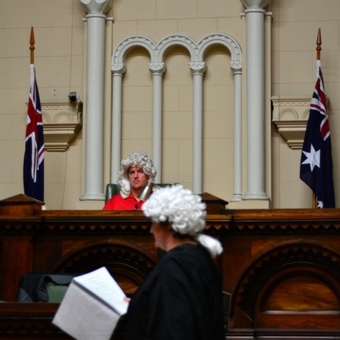Family Law Review Must Rectify Under Funded, Over-worked System
Family Law Review Must Rectify Under Funded, Over-worked System
Australia’s family law system – subject to its most comprehensive review in 40 years - is chronically under-funded and its Judges chronically over-worked. Cassandra Pullos says the family law review, due to begin in October, is long overdue and a priority should be to increase funding and resources because Judges are swamped with the sheer volume of matters they have to consider each day.
“I had a matter on the Judge’s List recently and the Judge had to get through 40 matters in one day. It means on average judges have barely 10 minutes per matter which is an intolerable burden on them and does not accord the proper amount of time each matter may need,” she says.
Cassandra says the community should strongly endorse the wide-ranging review, and be open to embracing alternative means to resolve divorce and parenting issues in a non- adversarial way.
Attorney-General George Brandis announced the review will be led by the Australian Law Reform Commission headed by Professor Helen Rhoades, and has until March 31, 2019 to report its findings.
Cassandra says the current Family Law system works on an adversarial approach to every family law matter. While there will always be cases that need to go before a Judge, more could be done to find non-adversarial solutions.
“At present every case goes through an adversarial “funnel” so we need to find a better way which reduces pressure on the courts and those needing their separation and parenting matters resolved,” she says.
“Over the next year or so you’re going to see heightened focus on the issues and what needs to be done to salvage our family law system.”
Cassandra strongly supports Collaborative practice, parenting co-ordination and increased use of arbitration and mediation as measures worth more investment.
The review’s terms of reference are broad but will address ensuring the family law system prioritises the best interests of children, measures to address family violence and child abuse, supports families and allows disputes to be resolved quickly and safely with minimal financial burden.
Cassandra agrees with an Australian Law Council assessment that any meaningful, long-term reform will need significant funding.
“Family law specialists would support measures which reduce congestion and pressure on the Family Court because, by extension, they could ease the process of separation for couples.
“In particular I strongly support measures that ensure the best interests of children are protected during the divorce process.
“Too often children are the unseen casualties of divorce wars fought by their parents, which is why an increasing number of family law specialists advocate the Collaborative Law approach to separation.
“Under this method couples resolve to find agreements outside the court system, mindful that it can take several years for a divorce to make its way through the Family Court logjam. This can impose enormous pressures on the children of separating partners,” she says.
An important new avenue to explore is parenting co-ordination, well established in America and Canada, and now offered in Australia. It employs a parenting coordinator, a person trained in dispute resolution, who can help parents achieve post-order parenting plan goals without having to constantly seek a Judge’s decision on every problem.
“Parenting co-ordinators work well in the American and Canadian family law systems and I believe they could be a major asset in Australia’s family law system too,” Cassandra says.
Increasingly, family lawyers view the under-resourced Family Court with its lengthy wait times for a final hearing- in some cases up to 3 years- as a major cause of disenchantment with the system.
“An avenue to explore is how we can enhance court resources while working to resolve most separation and parenting matters away from the courts through collaboration and co-operation, and have only the most extreme cases, where participants have no hope of resolution, go before the court for a decision,” she says.
Cassandra feels the next year could be the most important in family law for Australia since the Family Law Act was established in 1975.
“We welcome the review and should embrace what it represents to bringing stability and trust back into our family law system,” she says.
If you need advice or assistance, call us on 07 5526 3646 or email us at cjp@pulloslawyers.com.au and one of our expert family lawyers will be able to assist you.
